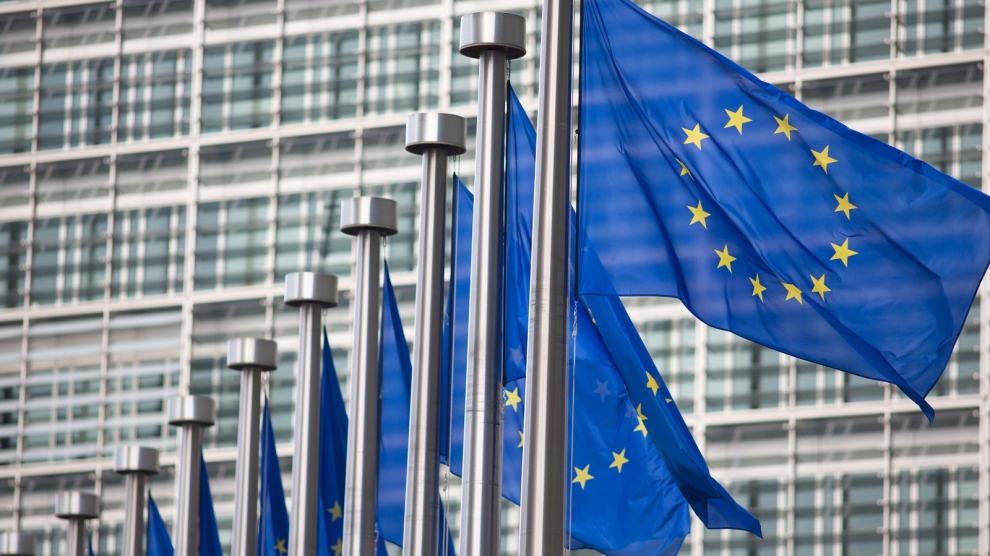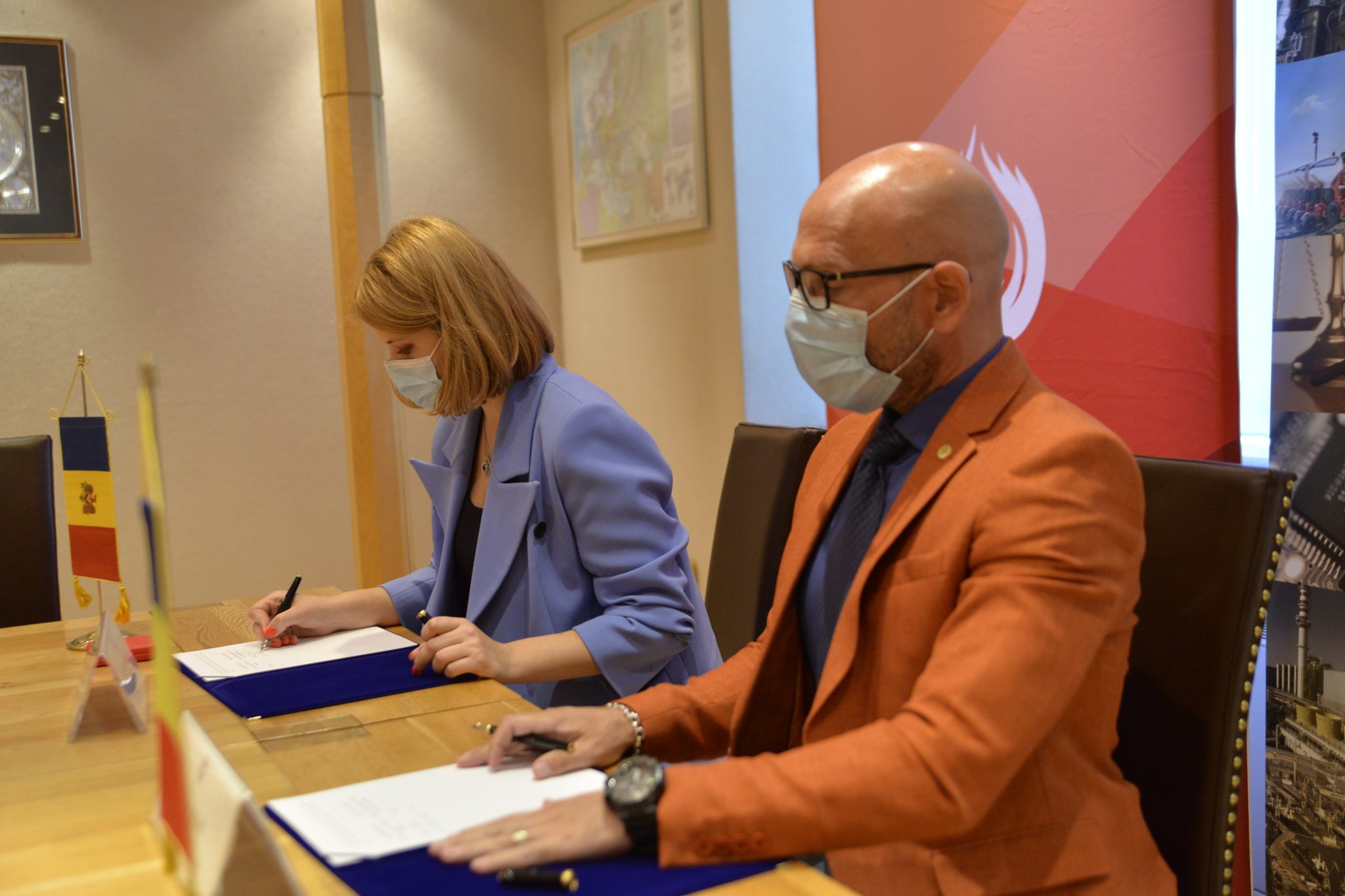Economy
Moldova's new PM: New government will revise role of state
Reading Time: 3 minutesThe soon-to-be new Government of Moldova will revise the role to be played by governmental structures and their destination, and will substantially raise their actual output for the nation, candidate for the premiership Vlad Filat stated during a large meeting he organized on Monday with the representatives of the civil society, employers associations, trade unions, business circles and the media to discuss the goals and priorities of his would-be cabinet.
The soon-to-be new Government of Moldova will revise the role to be played by governmental structures and their destination, and will substantially raise their actual output for the nation, candidate for the premiership Vlad Filat stated during a large meeting he organized on Monday with the representatives of the civil society, employers’ associations, trade unions, business circles and the media to discuss the goals and priorities of his would-be cabinet.
Filat stressed the role to be played by state structures shall be to serve the country, not solely some parties or certain personalities. Accordingly, such structures will be strictly accountable to the Government, but this will be done transparently, "without usurping of state power by one person. First and foremost, this is necessary for the Government itself".
Many company managers, trade union activists, representatives of insurers’ association, bankers, transport sector officials spoke out a whole number of proposals to the future government. For instance, employers said that essential decisions should be taken upon preliminary agreement with employers’ associations, and that the government should have its permanent representatives at the Ministry of Labor and other state structures.
Trade unions, driven by their main mission – protection of working people’s interests – called upon the government to curb recession in the economy’s real sector, create new jobs and provide financial and social privileges to young specialists.
"Moldova’s basic problem is a very low level of salaries and wages. Our people want to work hard and to receive salaries corresponding to prices in shops and utility rates", stated Moldovan Trade Union Confederation Chairman Petru Chiriac.
He recommended the Government to adopt a law on the subsistence minimum, which would let raise pays in various economy sectors, including the public sector. Currently, for instance, the minimum wage in the real sector is 900 lei (US$80) a month, and in the public sector – 600 lei.
Trade unions proposed to introduce a new mechanism of indexation of salaries, to create a Socio-Economic Council, to institutionalize a Labor Tribunal and a Labor Arbitration in order to better protect workers in crisis conditions.
Pavel Caba, Chairman of the Building Companies Managers’ Association, drew Filat’s attention to the very hard situation that has developed in the building sector, where economic indicators have dropped by 50% against last year. At the moment, apartments totaling over 1 million square meters of dwelling space have been frozen at various stages of readiness, which means that approximately 1 billion euros has been frozen. Many of the apartment houses were started months ago on money obtained from banks, and now, when sales of dwellings are slack, building companies cannot return credits to banks, requesting credit restructuring.
A real, shameful problem in Moldova is the red tape, people of business said. In very many instances, the procedure of obtaining permissions, documents and approvals takes as long as to build a large multistory apartment house – 2 years.
Caba proposed the Moldovan state, in person of the Moldovan Government, should take part in mortgaging by means of obtaining cheap and long-term credits from abroad.
Moldovan Banking Association Chairman Dumitru Ursu presented the current situation in the Moldovan banking sector. He said, in particular, that the inflation suppressing measures, undertaken by the previous Government in 2008, led to deflation in the first half of 2009, which means the previous Government failed to take proper measures to protect domestic producers.
Ursu proposed founding a council or committee for financial stabilization, as is being recommended by the European Union. Such body could comprise the representatives of the National Bank, National Commission for Financial Market and other structures that would be coordinating joint steps to prevent financial risks.
Among problems that need to be tackled urgently Ursu mentioned: a new requirement to come into effect from 1 January 2010 – on income taxation of bank deposits of corporations and individuals; a better filling of the Fund for crediting small and medium-size enterprises with cheap and long-term credits from abroad; and raising of the security sum on bank deposits (currently, the sum is merely 6,000 lei, or US$526 equivalent).
The Chairman of the Agricultural Producers’ Association Vasile Bumacov said that farmers’ real enemy is not drought or floods, their real enemy is economic discrimination. He offered the Government to determine priority spheres in the farm sector proceeding from the assumption that, for instance, Moldovan grain farmers will hardly ever be able to win competition with their Western colleagues. Accordingly, he presumes, the Government should have a more cautious and wise approach to projects in the farm sector that are realized on foreign donors’ means, and should possibly avoid instances when all foreign means provided for a project go away in salaries to foreign experts working in the project.
Economy
Moldova will receive a disbursement of 36 million euros as part of the the Economic Recovery Plan

This week, the European Commission approved the disbursement of 36 million euros in grant money for the Republic of Moldova. The announcement was made by Deputy Director-General for Neighbourhood Policy and Enlargement Negotiations at the European Commission, Katarina Mathernova, who paid an official visit to the Republic of Moldova between September 13-15, together with Managing Director for Russia, Eastern Partnership, Central Asia, Regional cooperation and OSCE, at the European External Action Service, Michael Siebert.
The EU officials had meetings with President Maia Sandu, Minister of Foreign Affairs and European Integration, Nicu Popescu, Speaker of Parliament, Igor Grosu, Prime Minister of the country, Natalia Gavrilita, as well as key representatives of Government, international financial institutions and the civil society, according to a press release issued by the Delegation of the European Union to the Republic of Moldova.
Beside such topics as the EU-Moldova relations and prospects, the priorities of the reform agenda of the new Moldovan Government, preparations for the Eastern Partnership Summit at the end of the year and the Transnistrian conflict settlement, the officials also discussed the EU assistance in support of reforms and the Economic Recovery Plan for Moldova, which was announced in June with a total EU support of 600 million euros over the next 3 years.
“The first measures under the Economic Recovery Plan will shortly materialize, with the expected disbursement of 36 million euros in grant money under budget support programmes to support the authorities’ efforts to fight against the consequences of the pandemic. Moldova can count on EU’s assistance on its path to reforms and to recovery, bringing tangible results to citizens,” Katarina Mathernova stated.
The plan is based on assistance provided by the European Union through various bilateral and regional instruments, aiming to mobilize the funds in the form of grants, loans, guarantees and macro-financial assistance.
“The Economic Recovery Plan for the Republic of Moldova involves much more, not just this financial support provided immediately. It must help digital transformation, strengthen infrastructure, energy efficiency, education and support small and medium-sized enterprises,” the EU official also said.
As Prime Minister Natalia Gavrilita informed, “The Economic Recovery Plan and the 5 flagship initiatives for Moldova in the Eastern Partnership will directly contribute to the reform and consolidation of institutions, stimulate long-term socio-economic development, bring direct benefits to citizens, and unleash new economic opportunities through promoting the green agenda and digitization. Small and medium-sized enterprises (SMEs) have been hit hard by the crisis. Promoting and diversifying access to finance and reducing collateral requirements will be essential in supporting economic operators. We are grateful to the EU partners who will launch two programs to support 50 000 independent Moldovan SMEs to adapt to the new conditions.”
President of the Republic of Moldova, Maia Sandu, welcomed the decision of the European Union to disburse about 745 million lei in grant money, as the official page of the President’s Office announced. “EU support comes after a long period of freezing of European assistance, caused by former governments. We managed to relaunch the political dialogue with the European Union and resume financial assistance. The Republic of Moldova is gradually regaining the trust of its strategic partners. This European support is also a signal of encouragement for the new Government team in its commitment to clean up the institutions, fight corruption and launch development programs in the country,” said Maia Sandu.
Photo: unknown
Economy
Romania and Moldova signed a partnership memorandum pledging to cooperate in promoting their wines

The Chamber of Commerce and Industry of Romania (CCIR) and the National Office for Vine and Wine (NOVW) of the Republic of Moldova signed, last week, a memorandum of cooperation on organizing joint promotional activities in the markets of common interest, as the CCIR announced.
China, Japan or the USA are just some of the markets targeted by the Romanian and Moldovan institutions. The memorandum also involves advertising activities for wines from common indigenous varieties, promoting the oeno-tourist region, developing a tourist route in the two states, exchange of experience, study visits, and mutual support in identifying new export opportunities. “We are very confident that this collaboration between our organizations will lead to sustainable economic growth and a higher degree of well-being among Moldovans and Romanians,” claimed Deputy Secretary-General of CCIR, Bogdan Visan.
On the other hand, Director of the NOVW, Cristina Frolov, declared that no open competition with Romania is aimed at the governmental level of the Republic of Moldova. “This request for collaboration is a consequence of the partnership principle. Romania imports 10-12% of the wine it consumes, and we want to take more from this import quota. Every year, the Romanian market grows by approximately 2.8%, as it happened in 2020, and we are interested in taking a maximum share of this percentage of imported wines without entering into direct competition with the Romanian producer,” the Moldovan official said. She also mentioned that Moldova aims at increasing the market share of wine production by at least 50% compared to 2020, and the number of producers present on the Romanian market – by at least 40%.

Source: ccir.ro
**
According to the data of the Romanian National Trade Register Office, the total value of Romania-Moldova trade was 1.7 billion euros at the end of last year and over 805 million euros at the end of May 2021. In July 2021, there were 6 522 companies from the Republic of Moldova in Romania, with a total capital value of 45.9 million euros.
The data of Moldova’s National Office of Vine and Wine showed that, in the first 7 months of 2021, the total quantity of bottled wine was about 27 million litres (registering an increase of 10% as compared to the same period last year), with a value of more than one billion lei, which is 32% more than the same period last year. Moldovan wines were awarded 956 medals at 32 international competitions in 2020.
Photo: ccir.ro
Economy
Moldova’s hope to be a top walnut exporter and its main difficulties

The Republic of Moldova has perfect weather conditions for growing walnut trees, that creating a great potential of walnut production and trade, especially on international markets, where the demand is way higher than the product’s supply. National and international experts believe that the country’s walnut production industry is on the verge of important transformations, which could lead to increased yields, quality and competitiveness worldwide.
According to authorities, Moldova exports 34-35 thousand tons of walnuts in shell, which is about 7% of the total export of fruit and 5% of the total export of horticultural products. The export value is assessed as being $120 million, that being 57-60% of the total fruit export value and about 50% of horticultural export value. Most of walnut crops are exported to the EU countries, such as France, Germany, the Netherlands, Romania and Austria. The country’s exports were among the world’s top 10 when it comes to the highest dollar value of the product during 2020.
Viorel Gherciu, Minister of Agriculture and Food Industry, pointed out that the production in the domestic walnut industry has increased by 55% in the last five years, which ranks Moldova among the main producers in the world.
“The biggest opportunity for this industry is that we are in the geographical proximity of the largest walnut import area in the world, which is the European Union, with almost 40% of total imports in the world. We are on the EU border, with privileged relations, with an Association Agreement. We already enjoy a good relationship in working with European importers, they trust our processors. A very close collaboration has been created and this is, in fact, the guarantee for those who invest in the area,” claimed the president of the Walnut Producers Association, Oleg Tirsina.
The data provided by the National Bureau of Statistics show that there are 34.7 thousand hectares of walnut plantations in the country. 20.90 hectares are represented by orchards. 75% of planted orchards are formed of old varieties trees. 30-35% of the exported production comes from orchards, the rest comes from individual farmers and plantations along the roads. This means that the quality of walnut production is not at its maximum potential. Developing commercial plantations through orchards modernization and extension of walnut varieties would provide double yield and better quality, experts say.
Governmental support in the form of subsidizing solutions, foreign investments and credit options are indispensable for the industry development. One of the financing options is the credit line of the European Investment Bank Project. Since 2016, 15 producers and processors of nuts, almonds and hazelnuts have benefited from these loans with the total amount of investments worth 8.7 million euros. A further extension of the project would provide another 60 million euros for the modernization of the horticultural sector in general and for harvesting organic walnuts in particular.
Photo: heymoldova.com





















